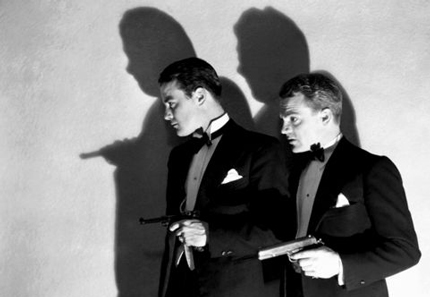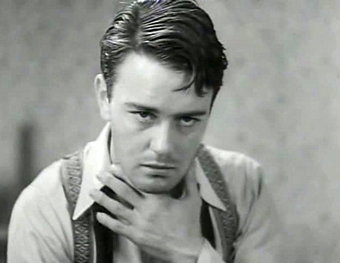
 |
|
|
|
The 'big three' classic sound gangster pictures are of course Little Caesar, The Public Enemy and Scarface, but they were preceded by a stack of gangster efforts that have become mostly forgotten. These proto-mob epics lack the star-power of greats like Edward G. Robinson and James Cagney, talents that brought 'gutter life' vocal skills to the early talkies that overpowered the stilted dialogue of play adaptations and stuffy Hollywood scenarios. Perhaps the closest 'also ran' is the alternately ruthless and sentimental The Doorway to Hell, starring Lew Ayres fresh from his success in Universal's All Quiet on the Western Front.. The movie has most of the requirements to qualify as a top gangster classic. It centers on the twisted personality of a major racketeer, it treats its subject realistically and it even depicts (off screen) the St. Valentine's Day Massacre, less than one year after the actual event. Finally, making The Doorway to Hell a must-see is the appearance, in his second film, of a sixth-billed James Cagney. Cagney's powerful natural delivery overshadows the work of the film's putative star. 
Young bootlegger Louie Ricarno (Lew Ayres) has made millions in the booze business, and as his parting gift to Chicago he unites all the warring gangs, winning the cooperation of the dummy Gimpy (jerry Mandy), the slippery goon Midget (Edwin Argus) and the hostile Rocco (Noel Madison). Peace reigns until Louie announces that he's quitting the business for retirement, and nominating as successor his second in command Steve Mileaway (James Cagney). Mileaway is unhappy, knowing that the gangs won't stay in line. Worse, Steve is in love with Louie's new bride Doris (Dorothy Mathews), and doesn't like it when her new husband takes her to a mansion in Florida to play golf and write his autobiography. But Louie's retirement dissolves when Midget and another hood fumble a kidnap attempt on Louie's kid brother Jackie (Leon Janney), a student at a military academy. Inflamed by vengeance, Louie returns to town to get even. But police Captain O'Grady (Robert Elliott) uses Louie's rash actions to set a trap for him. Ricarno was always too smart before, but now O'Grady will let his rival gangsters do what the law failed to do. The Doorway to Hell really has everything a fan of Warner gangster pictures could want. Ace crime writer Rowland Brown (Quick Millions, Blood Money, Angels with Dirty Faces, Kansas City Confidential) puts snap into the action. The opening scene sees hit man Dwight Frye (excellent) reclaiming his "violin case" from behind the bar of a pool hall, and using it to rub out a snitch. His big dialogue line is, "I'm going to teach a guy a lesson." The gang war is represented by a (pretty unbelievable) street battle that has gangs with clubs going at it while pistols, rifles and machine guns blaze all around. Otherwise the violence is mostly understated. At one point Louie drops a dead body at the feet of both his rivals and the cops, but we don't see the torture-killing. The underworld backlash, including a massacre much like the one at the Clark Street Garage a year before on Valentine's Day, is depicted in newspaper headlines and photos. But the implied violence pays off in that we expect a killing to happen at any time, from any direction. 1 
Lew Ayres has been criticized as too young and inexperienced-looking for the part, which is false considering that gangland characters came in all shapes and ages - the infamous Purple Gang was run by kids barely out of their teens. Yet Ayres doesn't quite connect the way Robinson and Cagney did. Louie Ricarno seems too refined to have grown up in the Little Italy slums that he points out to his new bride, Doris, and he seems too green, too dapper to intimidate a room of toughs. Ricarno is keyed to the ambitious Napoleon, through a picture he frequently regards on his wall. Cagney ribs him with a comic Napoleon gesture. We'd expect a racketeer to be at least a little paranoid, but Louie is oblivious to Doris's ongoing affair with Steve Mileaway. When the lovers take time out to "stop off somewhere" away from Louie's supervision, Doris removes her wedding ring. A fadeout follows almost immediately. The gesture is pure cinematic shorthand. Some of Archie Mayo's direction is on the stiff side. The cop O'Grady speaks very slowly, with long gaps as if he were milking his part on stage. I credit the pace of some of the dialogue scenes with the film's reputation as a creaker. James Cagney, of course, is incapable of being dry or stagey -- when the detective shows up at the door, his Mileaway shouts back at Louie, "Oh Maaa! That MAN is here again!" The film is also padded with several 'wholesome' scenes showing that Louie dotes on a young kid brother in a military school. Louie and the two-timing Doris become 'nice people' when in contact with the cloying, cherub-faced Jackie. The later gangster classics had their sentimental angles, but the plot complication of Jackie's misfortune has more to do with standard melodrama than the new streetwise realism. As such The Doorway to Hell loses a few points. 
The show recovers almost completely in its final reel. The now-ruthless Louie, shorn of both Steve and Doris, breaks out of prison only to find that his escape has been engineered just to allow Rocco to exact his own personal revenge. The big cop O'Grady is going to stand by and do nothing. His case against Louie fell apart, and letting Rocco kill him is an easy way to rid the city of a "public menace." The final scene plays out in a claustrophobic "No Exit" rented room, where Louis gathers up the nerve to meet his fate head-on. In one of the creepier conclusions to an early talkie, the screen dissolves to the last page of Louis' uncompleted biography, which O'Grady said would only be finished at the Doorway to Hell. "What's that fancy word that books end with?" Louis had asked of Doris .... Finis. The Warner Archive Collection DVD-R of The Doorway to Hell is a very good rendering of this very old talkie. The picture is in fine shape, with only a bit of frame damage here and there. The images are so nicely preserved that we can tell when the cameraman didn't quite make focus on a close-up of James Cagney on the phone. I guess established stars merited retakes, but not up-'n'-coming punk actors, who were probably reprimanded for not staying in focus! A little digging reveals that the airy school attended by young Jackie is the Pacific Military Academy in Culver City. It was shut down a year or so after WW2 and by the 1960s had been obliterated by a housing development. So nothing remains, certainly not that big building on the hill. I hope I haven't missed any more proto-gangster classics in the Warner Archive Collection -- please point them out to me if I have!
On a scale of Excellent, Good, Fair, and Poor,
The Doorway to Hell rates:
Footnotes:
1. Freezing the frame on any of the newspaper inserts in this show is very educational. Any given lead story includes only two lines of appropriate copy before random lines of type are inserted. The resulting surreal effect now seems a criticism of the usefulness of many news stories.
Reviews on the Savant main site have additional credits information and are often updated and annotated with reader input and graphics. Also, don't forget the 2011 Savant Wish List. T'was Ever Thus.
Review Staff | About DVD Talk | Newsletter Subscribe | Join DVD Talk Forum |
| ||||||||||||||||||